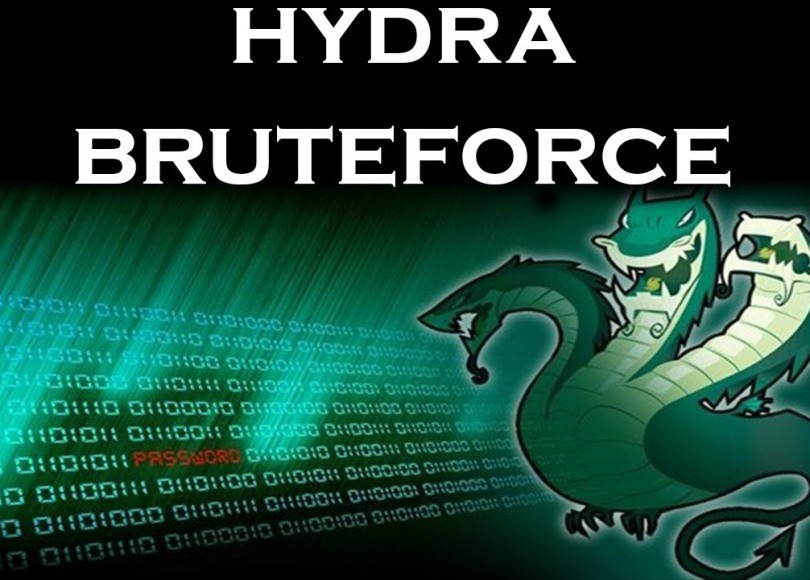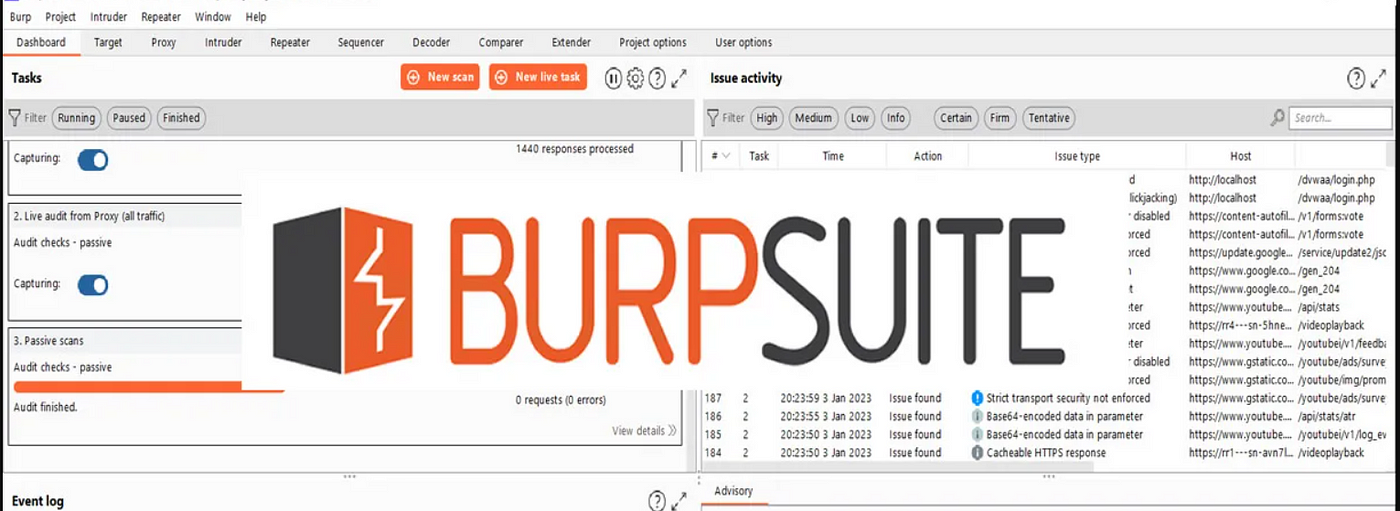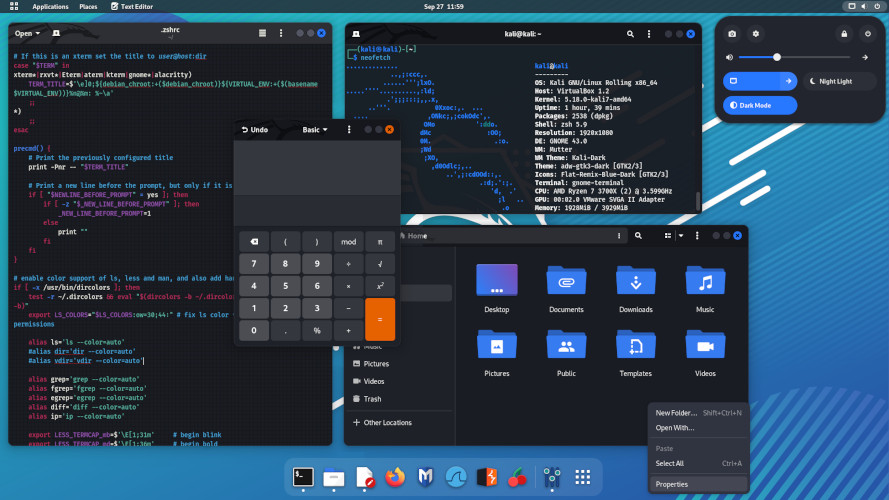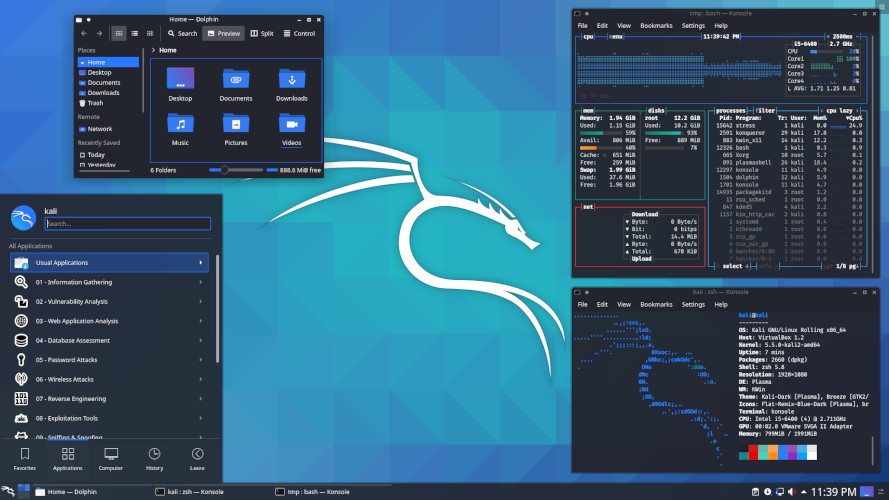9 best Linux apps for penetration testing
Last Updated on May 22, 2024 by Jhonni Jets
Penetration testing, also known as pentesting, is the practice of evaluating the security of computer systems and networks by simulating attacks from malicious actors. Conducting penetration tests is a critical part of maintaining security and identifying vulnerabilities. While penetration testing can be done on any operating system, Linux is particularly well-suited for this task due to its versatility and wide range of security tools.
This article will discuss the 10 most useful Linux applications for pentesting across different categories, from network analysis and vulnerability scanning to password cracking and wireless attacks. Whether you’re a beginner just starting out or an experienced cybersecurity professional, these Linux pen testing tools will help evaluate your systems and networks in a safe, controlled manner.
Table of Content
Nmap

The de facto standard for network discovery and exploration, Nmap has been a mainstay pen testing tool for over 20 years. Nmap uses raw IP packets to determine which hosts are online, what services they are running, operating systems in use, and dozens of other characteristics. It supports common techniques like ping sweeps, port scanning, operating system detection, and service/version detection.
Some key Nmap features include comprehensive output, dozens of stealth scanning options to evade detection, extensive protocol support including IPv6, load balancing and parallel scanning for speed, and NSE scripting for custom probes and vulnerability testing. Nmap is an essential first step in any penetration test to map out the target environment before moving on to more advanced techniques.
Nikto

Nikto is a feature-rich web server scanner designed to test web servers for dozens of potentially dangerous files, outdated server software versions, and vulnerabilities. It comes bundled with over 6,500 potentially dangerous files and vulnerabilities in its databases to check for on target servers. Nikto supports comprehensive HTTP methods including GET, HEAD, POST, and others to thoroughly probe servers.
In addition to scanning for specific issues, Nikto can perform general web server reconnaissance like lookups for server software and modules, SSL/TLS capabilities, server admin panels, backup and unreferenced files, and server configuration issues. Its output is organized into clear PASS, INFO, and FAIL categories to easily triage results. Nikto should be a go-to tool after internal networks have been mapped with Nmap to reveal web server vulnerabilities.
Metasploit

As the preeminent open-source penetration testing framework, Metasploit provides tools for information gathering, vulnerability analysis, exploit development, and post-exploitation. It includes an expansive database of exploits, payloads, auxiliary modules, and encoders that can be used to automatically test for and exploit vulnerabilities on target systems.
Some key Metasploit features include the msfconsole command-line interface for launching exploits and post-modules, an intuitive Ruby-based programming framework for developing custom exploits and tools, automated scanning and exploitation through the free Metasploit Pro product, and integrations with vulnerability scanners like Nessus. Metasploit acts as the center of any red team activity by tying together vulnerability scanning, exploit research, and hands-on access for deep system assessments.
Wireshark

As one of the most powerful network packet analyzers available, Wireshark is indispensable for sniffing packets, analyzing protocols, and troubleshooting network issues. It supports capturing and offline analysis of traffic from a variety of physical and virtual network interfaces. Wireshark can decode over 1,500 different protocol types and display detailed information about packets like IP headers, TCP flags, HTTP requests/responses, and more.
Some common usages during penetration tests include analyzing network flows for suspicious activity, confirming vulnerabilities identified by scanners, monitoring responses to exploitation attempts, capturing credentials and sensitive data in plain text protocols, and verifying encryption and authentication of secure protocols. Wireshark’s broad protocol support and powerful filtering make it a top choice for low-level network inspection.
Hydra

When brute force attacks are necessary, Hydra is the gold standard password cracking tool. It supports over 50 protocols for online password guessing, including FTP, HTTP, SSH, Telnet, and more. Hydra can perform quick brutforce attacks using wordlists, mask-based attacks to insert numbers/symbols, and even custom character sets for targeted cracking routines.
By default, Hydra runs concurrently on multiple connections and addresses to maximize throughput. It includes mechanisms to avoid rate limiting, stay stealthy, and handle password leak responses gracefully. Password files harvested from services like HaveIBeenPwned can be directly used for cracking. Hydra should only be run against systems you have authorization for, but it’s an effective way to gauge password strength on target environments.
John the Ripper

While Hydra focuses on online attacks, John the Ripper is the strongest tool for offline password cracking. It supports a vast array of hash algorithms used to store passwords, including NTLM, Kerberos 5, LM, Cisco PIX, and IPSec. John can identify password patterns, test against huge wordlists containing billions of terms, apply mangling rules, and utilize GPU hardware acceleration for maximum performance.
Some key advantages over other offline tools include powerful combinator cracker modes for compound words/phrases, incremental mode to resume old sessions, and an easy to use Jumbo patching mode allowing cracking of arbitrarily sized alphanumeric passwords. John the Ripper is indispensable when hashes or password backups are acquired from target systems.
Aircrack-ng
As the de facto suite for wireless auditing and attacks, Aircrack-ng brings together a variety of tools under one umbrella. Some of the key components include aireplay-ng for injection attacks, airodump-ng for packet capturing, aircrack-ng for cracking WPA/WPA2 keys, and airmon-ng for managing monitor mode. All operate seamlessly together for a complete wireless assessment experience.
Common techniques involve scanning for wireless networks with airodump-ng, capturing 4-way handshakes with aireplay-ng, and cracking captured PMKID or password hashes offline using aircrack-ng with wordlists, hashes, or brute force. Aircrack-ng makes auditing wireless networks and exploiting vulnerable configurations straightforward on Linux systems.
Burp Suite

For web application testing, Burp Suite provides the most full-featured set of tools in one package. It acts as a proxy to intercept, modify, and replay HTTP/HTTPS traffic between a browser and target site. Burp’s intruder module allows powerful automated fuzzing, parameter tampering, and brute forcing of inputs. The spider crawler maps complete application flow and finds hidden parameters.
Additional features include a repeater to inspect individual requests, a scanner for detecting vulnerabilities, a sequencer to match requests/responses, and a decoder for common encoding schemes. Professional editions include useful additions like site mapping, dynamic scanning, and automated assessment. Burp Suite enables thorough testing of web apps down to the protocol level.
Kali Linux

Although not a single tool, Kali Linux distributions bundle together hundreds of the most commonly used pen testing applications in one curated Linux toolkit. As the flagship distro for security assessments, it comes pre-installed and pre-configured with Nmap, Metasploit, Wireshark, Hydra, John, Aircrack-ng, Burp Suite, and many others covered above.
Kali also provides helpful utilities like virtual machine environments, full pre-compliance checks, ARM/IoT images, and expertly selected default tools like Sqlmap, Maltego, Set, and many more. Its easy-to-use launching mechanisms make starting any security task simple without complex installation steps. For beginners and experts alike, Kali remains the ultimate Linux penetration testing platform.
Conclusion
This article covered the top 10 Linux penetration testing applications across categories like network analysis, vulnerability scanning, password cracking, wireless attacks, and web applications. Tools like Nmap, Nikto, Metasploit, Wireshark, Hydra, John the Ripper, Aircrack-ng, Burp Suite, and full featured distributions like Kali Linux provide security professionals a robust open-source toolkit on Linux for safely evaluating systems.
Whether you are a beginner just starting out in penetration testing or an experienced consultant, these powerful Linux apps should be core parts of your security assessment methodology. By leveraging these freely available tools, organizations of any size can comprehensively test their environments, understand risks, and strengthen their overall cybersecurity posture over time.







